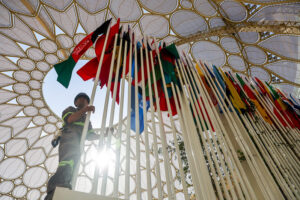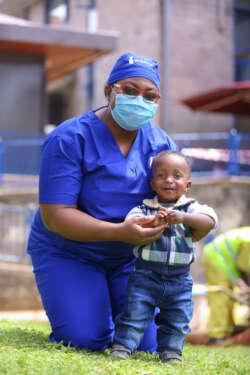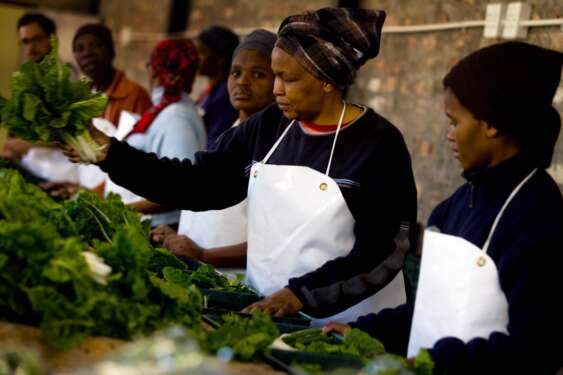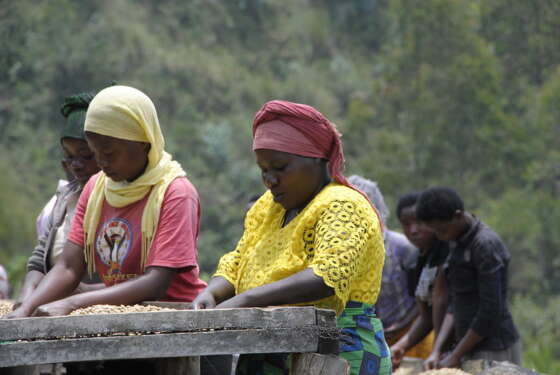- 1.5°C future on the line: Why nations must cut emissions now or lose target
- IMF Growth Forecasts: BRICS to Lead the World in the Next 5 Years
- Vantage Capital seals exit from PickAlbatros Hotels after $18.4M pandemic boost
- Madica backs Earthbond in bold pre-seed bet on sustainable solutions
- Venture capital and debt drive growth in Kenya’s agri-tech sector
- Sustainability Week Africa: Pioneering change amidst climate challenges
- Refugee Crisis in Chad as War and Hunger in Sudan Drive Thousands Across Border
- Senegal 2050: A Blueprint for Economic Transformation
Author: Kimani Chege
In the months of May to July, Ololung’a market in Narok County has always been a busy spot with various agricultural activities happening in this maize-producing area. However, this year, everything seems relaxed and just a few tractors are packed by the roadside.
The rains have not been as promising and stretches of farms lie idle, un-ploughed. Pareiyo Oloomunyak, has always planted maize on his 17-acre farm. However, this year, he has reduced the area under production as the cost of ploughing and farm inputs has almost doubled.
He expects a reduced harvest but also prays for better payments from the sales he will make. He purchased a reduced number of bags of fertilizer which he sparingly applied to his farm against the advice of agricultural experts. “You find us using less fertilizer than recommended because we still want our crops to have a little boost, and maybe supplement with …
The acquisition of equity on HotelOnline for an undisclosed amount enables the Asian travel company to make sales and introduce its travel-based SaaS (Space as a service) technology in Africa. This is part of the $1.7 billion investment that the Korean company raised last year from SoftBank Vision Fund 2, one of the world’s largest technology-focused investment funds.
Yanolja is scheduled to go public on NASDAQ in 2023 and they have the backing of global travel leader Booking.com.
Jongyoon Kim, CEO of Yanolja Cloud has been on the record emphasizing the need to enter into a partnership with a major African travel entity and the pursuit seem to have been achieved.…
Nairobi needs a few changes in transport. First of all, the Central Business District should be free of Matatus. This means of transport is as old as independent Kenya and on a good day, ferries 80 per cent of Nairobi dwellers. It also racks millions in income both for individuals as well as taxes. However, the industry makes the city lose more than it makes.
Matatus are known for breaking all transport rules including double parking, blocking lanes and sometimes harbouring criminals. It costs even more money to position policemen and county government officers to reinforce discipline.
Trams and light rails have always been mooted. However, the cost and time for this have made the idea be delayed. Creating circular high capacity-bus trips commonly known as Bus Rapid Transport (BRT) system in key roads around the CBD and fed by well-positioned termini from the estates will ensure that there is …
The solution, currently under deployment by DPA is tailored to the hospital’s energy needs and designed to increase efficiencies. It will be grid-tied with photovoltaic (PV) of 80 kWp capacity and mounted on the rooftop.
This will see the facility save 30-40 per cent of their monthly electricity cost of approximately KES 550,000- this is through the use of solar power and reduced maintenance costs of all major hospital equipment affected by erratic power fluctuation.
The hospital sector, in operation 24 hours a day, 365 days a year, is one of the areas with high energy consumption and NCH joins a growing list of companies, universities, factories and hospitals in Kenya that have turned to solar PV grid-tied systems to supply power for self-consumption.…
The month of March marked one year after most countries globally locked up their people, introduced tough restrictions on movement and introduced ways of containing the Novel Coronavirus (Covid-19). For East Africa, this has been a tough outing with thousands sick, and millions affected economically. The countries in the region have also reacted differently, with Rwanda and Kenya being on the extreme cautious path, while Tanzania and Burundi have applied the Laissez-Faire approach.
Stocks in the region have been hit hard with the regional bourses shrinking significantly, as well as a loss in interest by foreign investors. The Nairobi Securities Exchange (NSE) seems to have been hard hit with an unprecedented bear run. According to the Capital Markets Authority (CMA) end-of-year statistical bulletin, all indices at the Nairobi bourse performed poorly, with net foreign outflow hitting KSh28.63 billion ($260.9M) compared to a net foreign inflow of KSh1.38 billion ($12.6M) in
Dr. Amanda Nang’andu Malungo, a Plastic, Reconstructive and Aesthetic Surgeon has shattered the glass ceiling to become the first female plastic surgeon in Zambia following her successful double qualification; Masters in Plastic and Reconstructive Surgery and the Smile Train- COSECSA Fellowship program.
Dr. Nang’andu has chosen to dedicate her career to treating cleft lip and cleft palate, a congenital malformation in which patients experience difficulty breathing, eating, speaking and hearing, some of whom die before their first birthday.
Many patients living with untreated cleft lip and/or palate are stigmatized and isolated. Dr. Nang’andu attained her Fellowship from the University of Nairobi in Kenya after receiving full scholarship from Smile Train, the world’s largest cleft charity.
“I was Introduced to clefts during undergraduate training and got involved in active cleft surgery during my specialist training. I was particularly touched by a young woman who was abandoned by her husband and family …
The 50 Million African Women Speak (50MAWS) digital platform is a practical initiative to empower millions of women in Africa to start, grow, and scale-up businesses by providing a one-stop-shop for their specific information needs.…
The Grassroots Business Fund (GBF), a global impact organization that utilizes the power of blended capital to invest in traditionally under-financed businesses, has announced the spin-off of its Latin America team into a new fully-fledged unit operating as Andes Impact Partners – AIP with its headquarters in Lima, Peru and is planning on expanding its African operations from Nairobi.
AIP launched APF-I in November 2020 with an initial focus on Peru and Colombia and a possibility to expand to other markets in the region. The fund targets inclusive businesses which incorporate underserved, vulnerable or low-income communities in their supply chains, helping to improve incomes and the quality of life of these communities. Target businesses must be committed to gender equity and to promoting equal opportunities. …
[elementor-template id="94265"]
The medical insurance industry in Kenya is exploding taking advantage of a growing digital sphere to introduce affordable covers. Carepay, the innovative medical insurance company with a presence in Kenya, Nigeria, and Tanzania is leading this effort with several partnerships aimed at bringing costs down.
The industry is still on the lookout of a replacement for affordable medical cover that will meet the needs of the majority while supplementing the government-provided cover. In 2015, Linda Jamii, a famed medical cover outfit by Safaricom and Britam Kenya collapsed after it was discovered it was not making much business sense to the companies. What followed was a huge uproar with users unable to find an alternative cover.
In this, the industry has been on the lookout for a cover that meets the interests of the underwriter as well as those of the users.
Recently
The East African region is primarily agricultural-based with the sector contributing an average of two-thirds of GDP and providing jobs to the majority of citizens. It is a key tax earner for governments and serves as a solid base under which the region’s industries are based. Agribusiness contributes about 25 per cent of Africa’s GDP and a staggering 70 percent of its employment.
Global food demand is expected to increase by somewhere between 59 percent and 98 percent by 2050 as the world population reaches an estimated 9.7 billion.
Most of the region's countries have an ideal climatic condition for agriculture and mainly rely on rain-fed agriculture. Kenya, the most developed economy in the region which interestingly has a diversified economy more than just agriculture is least endowed in rain-fed agriculture compared to Tanzania, Rwanda, and Uganda.…
[elementor-template id="94265"]













